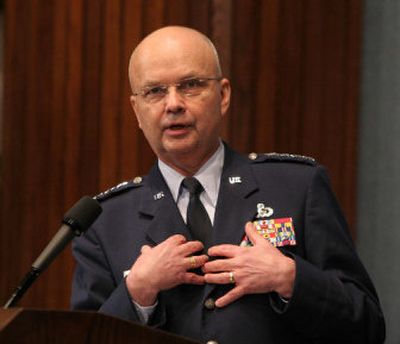Bush to push eavesdropping fight

WASHINGTON – The nomination of Gen. Michael Hayden to take over the CIA would trigger a fresh battle over the secret warrantless surveillance program he oversaw on behalf of President Bush, a debate that could help shape the contours of the fall midterm congressional elections, officials in both parties said Saturday.
Barring a change of heart, aides expect Bush to name Hayden Monday as his choice to succeed CIA director Porter Goss, who resigned under pressure Friday. Hayden, a former director of the National Security Agency and currently deputy director of national intelligence, has become the most forceful defender of Bush’s eavesdropping program since its disclosure in December.
Rather than steer away from a Hayden nomination because of the controversy, the White House seems ready for a new fight over it, convinced that it has public support and would leave Democrats opposing his confirmation at risk of looking weak on terrorism. Democrats Saturday began formulating a strategy built around grilling Hayden during hearings and then determining whether any refusal to answer questions provides enough justification to oppose his confirmation.
“By nominating him, they are looking for a confrontation and forcing the Congress to take sides, so I am troubled by this,” said Rep. Jane Harman, D-Calif., vice chairman of the House intelligence committee, who has a close relationship with Hayden and considers him “very professional and dedicated.”
A senior White House official said Bush did not choose Hayden to pick a fight, but would welcome one if it came. “We felt that we’re in a position on offense,” said the official, who spoke on condition of anonymity because the nomination has not been announced. “We have no concerns about a public debate over the terrorist surveillance program.”
Not only Democrats expect to use a Hayden nomination to revisit the legality of the surveillance, however. Senate Judiciary Committee Chairman Arlen Specter, R-Pa., who has held four hearings on the matter, said he may try to hold up Hayden’s confirmation if the administration does not provide more information about the eavesdropping. He said he would try to convince fellow senators as “leverage.”
“I was briefed by General Hayden and I got virtually no meaningful information,” Specter said in an interview. “Now with Hayden up … this gives us an opportunity to ask these questions and insist on some answers if the Senate is of a mind to deny confirmation.”
While Hayden has enjoyed a strong reputation among lawmakers from both parties and never encountered confirmation trouble in the past, his selection also would raise questions about the rising military influence over U.S. intelligence and about his ability to be independent from Bush and Defense Secretary Donald Rumsfeld.
If he is confirmed, Hayden would face the challenge of rebuilding an agency that has gone through a tumultuous period, first by failing to prevent the terrorist attacks of Sept. 11, 2001, then by misjudging Iraq’s weapons program and most recently by enduring the break-the-china management of Goss, who drove many veterans out of Langley.
Goss stepped down after Director of National Intelligence John Negroponte told him in April to leave by May. White House spokeswoman Dana Perino Saturday said it was “categorically untrue” that Goss lost Bush’s confidence almost from the start of his 18-month tenure, but neither Goss nor the White House offered a public explanation for his resignation.